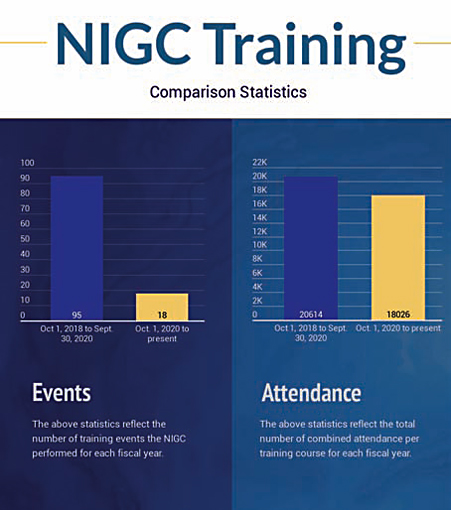
The Covid 19 pandemic required the National Indian Gaming Commission (NIGC) to recalibrate many of the tools we use to meet our regulatory mission. Technology’s increased role in the regulatory community’s work drove much of this change. The NIGC’s attention to the Indian gaming industry’s use of technology and the NIGC’s own use of technology in its operations during the pandemic will continue to influence how the agency meets its mission well into the future.
Although this article focuses on technology’s impact on the NIGC’s approach to training events in light of the pandemic, the pandemic has amplified how technology impacts other aspects of the Indian gaming regulatory community’s work, including the need to anticipate the adoption of new technology in game play, improvements in the regulatory community’s focus on cybersecurity, and increases in the public’s understanding of the regulatory community’s role in supporting the Indian gaming industry’s success. An extended discussion on these topics will soon be available on the NIGC website at NIGC.gov.
The NIGC’s core mission focuses on the protection of tribal assets. This mission is guided by the Indian Gaming Regulatory Act (IGRA) and the act’s framework for industry oversight, including the shared roles of the NIGC and tribal governments’ gaming regulatory authorities. A unique federal responsibility under the act is the NIGC’s mandate to provide technical assistance to tribal gaming operations. One of the ways in which the NIGC meets this mandate is through its training program. NIGC trainings—including large-group, one-on-one, and site-specific training events—are an important means to support tribal compliance with IGRA and commission regulations.
Throughout the pandemic, the NIGC has been dedicated to standing up remote methods to modify its work. The agency’s transition included adjustments from live in-person training events to virtual and on-demand recordings. By transitioning all of its large group training events to virtual formats, the NIGC has seen both increases in participation and improved experiences for attendees as well as reduced costs for both the NIGC and attendees.
The NIGC’s refined approach to training events includes three types of large-group events:
- National Virtual Training Conferences—Three-day virtual events covering nine courses on a broad range of timely topics based on regulatory and compliance needs and highlighting panel discussions with subject matter experts.
- National Monthly Training Topics— A new virtual training event concept developed as a result of the pandemic. It responds to specific needs that tribes and operations are facing and includes discussions featuring best practices that are led by NIGC staff, industry experts and guest panelists from tribal, state and federal partners.
- Boot Camps— An intensive and interactive training event aiming to increase capacity around key disciplines in the regulatory community. The two-day workshop format helps attendees develop core skills in areas such as internal auditing, licensing programs and information technology security, and focuses on the relevance of those skill sets to the NIGC’s minimum internal control standards.

The graphic above illustrates comparative data on NIGC training events and attendance from October 1, 2018 thru September, 30 2020 compared with October 1, 2021 to April 2021. With having completed just half of the training events for this fiscal year, the NIGC has reached almost 80 percent of the previous two years’ totals.
In addition, the NIGC has committed to growing its collection of online, on-demand training resources, including online recordings and summaries of training events. The NIGC records all training events and makes them available through online registration on our webpage. Further, the NIGC is working towards developing a robust video library to include event participants’ comments and NIGC responses to questions. There has been a higher rate of virtual event comments and questions compared to in-person events because of the virtual presentation format’s interactive comment tools. Participants’ comments help the NIGC assess future training needs with greater accuracy and better ensure the NIGC remains accountable and consistent in its interpretations of regulations and policies.
And just as important, the NIGC is broadening attendance at its training events with its virtual formats. Technology, via virtual venue, has made training events more accessible to all stakeholders and eliminated participants’ travel costs. As the graphic illustrates, a virtual platform has increased participation during the current fiscal year and is on track to rival the prior two years combined. This increase in participation has been accomplished with a fraction of the events and presentations, meaning a substantial cost savings to the NIGC in the hundreds of thousands of dollars compared to past years’ costs. These efficiencies brought about by the use of technology are an especially welcome outcome in light of the uncertainty and costs borne by the industry because of the pandemic.
As the NIGC assesses the success of virtual formats in its approach to training, the agency will remain focused on ensuring its training events contribute to improved agency performance. Reduced cost and greater capacity are positive indicators that can already be seen because of technology’s impact on training. It will remain important for the agency to reevaluate and, where necessary, establish new indicators to assess outcome-oriented performance measures ensuring accountability to and progress toward achieving the compliance goals at the heart of the NIGC’s mission.
The agency is anxious to return to its in-person work, which provides benefits that cannot be replaced by technology and virtual interactions. A continued focus on technology in the agency’s training work will have its limitations; it will, however, offer significant potential in both the NIGC’s response to the pandemic and a means to improve the NIGC’s efficiencies and performance. Capitalizing on these opportunities will support the industry’s ability to rebound and underscore the historically strong commitment by Indian gaming to integrity and the protection of tribal assets.






